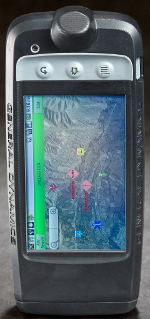Rugged Android device vendor pays Microsoft tax
Jun 27, 2011 — by Eric Brown — from the LinuxDevices Archive — viewsMicrosoft has continued to push its patent claims into Android territory by signing a patent agreement with General Dynamics' rugged device subsidiary Itronix. The agreement provides broad coverage under Microsoft's patent portfolio for Android devices, says Microsoft.
 As usual with Microsoft patent agreements, the contents have not been disclosed. However, Microsoft says it will receive royalties from General Dynamics Itronix.
As usual with Microsoft patent agreements, the contents have not been disclosed. However, Microsoft says it will receive royalties from General Dynamics Itronix.
It is unclear what patents Microsoft is enforcing with Itronix, a subsidiary of military contractor General Dynamics C4 Systems. General Dynamics Itronix develops wireless, rugged computing solutions including laptops, ultra-mobile notebook PCs, and tablet PCs. Last year shipped an Android-based tactical computer called the GD300 (pictured above and further below).
Microsoft's formidable legal team has steadily plowed through a crop of Linux device vendors in recent years, harvesting patent agreements over Microsoft's claims to foundational technology associated with Linux. More recently, the company has pursued Android vendors, for example enticing HTC to pay royalties as part of a broad patent agreement covering Android devices signed back in April 2010.
Last month, a Citi analyst said that Microsoft is receiving $5 per Android phone from HTC, and is aiming to squeeze $7.50 to $12.50 per device from other vendors. According to some observers, the $150 million per year sum from HTC is five times more income than Microsoft receives for its Windows Phone.
While many of the Linux device agreements appear to relate to patents Microsoft claims over the FAT filesystem, as was revealed in Microsoft's successful lawsuit against TomTom, the Android claims could instead relate to UI techniques. At least this is what was revealed by Microsoft when Barnes & Noble refused to pay protection money to Microsoft over its Android-based Nook e-reader, and was sued by Redmond in March. Microsoft's official statements in that case suggested that the cited UI techniques may be similar to those covered in the HTC case.
As detailed by our sister publication eWEEK, the bookseller's counterclaim — filed April 25 with the U.S. District Court for the Western District of Washington at Seattle — described Microsoft as repeatedly arguing that its patent portfolio would "entirely preclude the use of Android operating system by the Nook." Barnes & Noble went on to accuse Microsoft of anti-competitive business practices.
Itronix' GD300
 The lawsuit against General Dynamics Itronix appears to focus on the GD300, the company's only Android device to date. Most of its devices, such as the GD2000 portable computer announced last week, run Windows.
The lawsuit against General Dynamics Itronix appears to focus on the GD300, the company's only Android device to date. Most of its devices, such as the GD2000 portable computer announced last week, run Windows.
The Android-based GD300 (pictured) is a wearable, eight-ounce tactical computer/GPS device intended for military applications. The device is built around a 600MHz Cortex-A8 processor, offers a sunlight-readable 3.5-inch WVGA touchscreen, and meets MIL-STD 810G specifications for ruggedness, says the company.
Stated Horacio Gutierrez, corporate vice president and deputy general counsel of Intellectual Property and Licensing at Microsoft, "We are pleased to have reached this agreement with General Dynamics Itronix, which is an example of how industry leaders address intellectual property."
Stated Mark Johnston, director of Strategic Computing Solutions for General Dynamics Itronix, "The completion of this agreement enables Itronix to meet the evolving demands of our customers with more diverse applications and increased functionality in products that incorporate the Android platform."
Since December 2003, Microsoft says, it has entered into more than 700 licensing agreements.
This article was originally published on LinuxDevices.com and has been donated to the open source community by QuinStreet Inc. Please visit LinuxToday.com for up-to-date news and articles about Linux and open source.